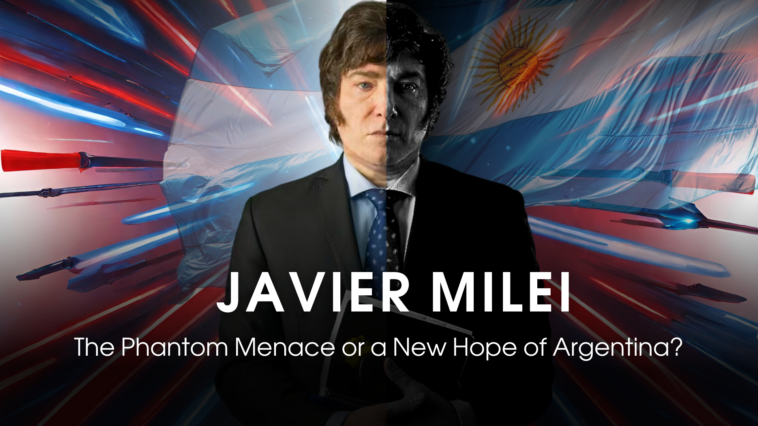Written by Anton Khimiak, analyst HWAG/UCMC
On November 19, Argentina elected a new president, Javier Milei. He is a right-wing libertarian with radical views (by his definition, an anarcho-capitalist) and a Catholic Tantrist (Tantrism is an esoteric sect of Buddhism and Hinduism). During the election campaign, the politician promised to introduce significant changes to free the country’s economy from the shackles of permanent financial crises. Of course, in politics, as in life, promises are like pie crusts, made to be broken. Nevertheless, the triumph of the eccentric Milei caused a stormy reaction from the international community.
International observers wonder about the potential impact of the electoral revolution in the South American republic on regional politics and the global balance of power.
And so, UCMC decided to examine the ‘political portrait’ of Milei in more detail, attempting to forsee the potential impact this change could have in Argentina’s foreign policy, and, of course, on Ukraine.
The Argentine Dream
Radical approaches to implementing libertarian principles characterise Milei’s economic program. He advocates the liquidation of the Central Bank, the abandonment of the Argentine national currency (the peso) in favour of the dollar, and a drastic reduction in government spending. As part of the “fight against bureaucracy”, the newly elected president will cancel subsidies, privatise enterprises, and reduce ministries.
The shocking nature of these steps is difficult to overestimate because, for example, the transition to the dollar is a rejection of part of one’s sovereignty and the transfer of the economy to dependence on the United States.
The main challenge is that Argentina’s economic woes can be resolved by institutionalising best practices in budget planning. It is necessary to introduce reforms, but the literal destruction of state institutions, such as the Central Bank, can play a bad joke on the economy.
The Latin American Gambit
Argentina’s new president has expressed scepticism about traditional trading partners such as China and Brazil, favouring stronger ties with the United States. In an interview for The Economist, he suggested that he will have complicated relations with his neighbours in the region because he will only be able to sit down at the negotiating table “with those who are for freedom”:
“I mean, I wouldn’t have any problems to sit down with Lacalle Pou (president of Uruguay – ed.), I would have no problem sitting down with the president of Paraguay, I would have no problem sitting down with the president of Ecuador. I would have no problem sitting down with the president of the United States.”
Javier Milei, Argentina’s new president
It is doubtful that Milei’s presidency will unbalance the region regarding a shared vision of world processes because not all of the leaders listed by Milei share similar views. Moreover, his idea of the role of South America in the world is also strikingly different from the course of his predecessors, who actively flirted with BRICS and autocracies like Russia or China. This characteristically distinguishes him from the background of the political elites of the Global South, who, as a rule, prefer a neutral position on the issue of Russian aggression.
After all, his political affiliation is, in one way or another, closely related to populism, which does not guarantee that the new leader of Argentina will fulfil the declared goals. Moreover, Milei may have considerable problems in the legislative implementation of his decisions because the balance of power in the legislative branch – the Chamber of Deputies and the Senate – does not favour libertarians.
Another significant factor lies in the influence of the vice president, elected alongside the president but assuming the role of the Senate’s president. Notably, the second most influential figure in the state is poised to be a controversial political figure much like Milei – Victoria Villarruel. She presents herself as ‘the first vice president, daughter of a Falklands War veteran,’ aiming to shut down a museum commemorating the victims of the military dictatorship that governed the country from 1976 to 1983.
Additionally, in Argentina’s federal system of government, the reach of the executive power is notably curtailed by regional authorities and the representation of provinces in the upper house of parliament.
World Superstar
Quite often, a non-standard politician attracts an increased level of interest but also caution or even fear from the world community. Meanwhile, the Russian Federation has already deemed Argentina no longer an attractive ally in terms of gaining its support on the international stage. The basis for this was Milei’s frequent statements about supporting Ukraine and recognising Putin as a dictator.
As a result, Moscow launched a campaign to discredit the newly elected president. For instance, RT published content that portrayed Milei as a fascist, employing a classic Kremlin tactic: brand all who refuses to ‘bend the knee’ as a fascist.
_______
Any changes in Argentina’s foreign policy, especially rapprochement with the West, will indirectly affect the geopolitical background of the Russian-Ukrainian war. Of course, at platforms such as the UN, Argentina consistently spoke and voted for resolutions demanding the withdrawal of its troops from the Russian Federation to establish peace (Resolution of the UN General Assembly ES-11/6).
However, the coming to power of such an unconventional politician as Milei can influence the revitalisation of the debate about opposing dictatorial regimes, which, from the position of the newly elected president of the country, also includes the Russian Federation.
The election of a chainsaw man in Argentina (the chainsaw served as a symbol of Milei’s election campaign) marks a specific break in the country with the traditional political establishment. While Milei’s radical economic program poses risks and uncertainties for the country, it also presents potential benefits if he stabilises the economy. The strengthening of the camp of democracies in the international arena is an essential signal of the resistance to the world order based on international law in the face of revisionist regimes.

